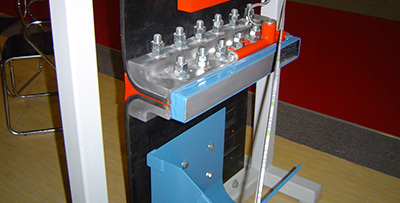News Center
Hezi technology focuses on the research and development of "rapid seamless conveyor belt joint sleeve" innovative technology project

NEWS CENTER

News Details
Why Quality Conveyor Belt Fasteners Are Essential for Industrial Applications
Release time:
2025-06-07
Why Quality Conveyor Belt Fasteners Are Essential for Industrial Applications The industrial landscape continuously evolves, driven by the need for efficiency, reliability, and safety. One crucial component that often goes unnoticed but significantly impacts these facets is the **conveyor belt fastener**. In this article, we delve deep into why quality conveyor belt fasteners are indispensable for
Why Quality Conveyor Belt Fasteners Are Essential for Industrial Applications
The industrial landscape continuously evolves, driven by the need for efficiency, reliability, and safety. One crucial component that often goes unnoticed but significantly impacts these facets is the **conveyor belt fastener**. In this article, we delve deep into why quality conveyor belt fasteners are indispensable for various industrial applications, highlighting their benefits, types, and best practices for maintenance.
Understanding Conveyor Belt Fasteners
To appreciate the importance of quality conveyor belt fasteners, it's essential to understand what they are and how they function. Conveyor belt fasteners are mechanical devices used to connect and secure the ends of conveyor belts, enabling continuous operation in a wide range of industrial settings. Their primary purpose is to ensure that the belt remains intact and operates smoothly, which is critical for maintaining productivity.
The Role of Conveyor Belt Fasteners in Industrial Operations
Quality conveyor belt fasteners play several pivotal roles in industrial operations:
1. **Ensuring Belt Integrity**: Fasteners secure the belt's ends, preventing slippage and ensuring that the belt remains in place during operation.
2. **Facilitating Quick Repairs**: High-quality fasteners allow for swift belt replacements or repairs, minimizing downtime and enhancing productivity.
3. **Enhancing Safety**: Properly secured belts reduce the risk of accidents caused by belt failures, contributing to a safer working environment.
Types of Conveyor Belt Fasteners
Various types of conveyor belt fasteners are available, each designed for specific applications. Here are the most common types:
1. **Mechanical Fasteners**: These are the most conventional fasteners, commonly used for various belt materials. They are easy to install and remove, making them ideal for quick repairs.
2. **Lacing Systems**: Lacing systems involve interlocking metal hooks that create a strong bond. They are suitable for heavy-duty applications where high tension and durability are essential.
3. **Vulcanized Fasteners**: This method involves chemically bonding the ends of the belt, creating a seamless joint. Vulcanized fasteners provide a stronger connection but require more time and expertise for installation.
4. **Clipper Fasteners**: Clipper fasteners are a flexible option, allowing for easy installation and removal. They are commonly used in light to medium-duty applications.
5. **Steel Rod Fasteners**: These fasteners are robust and provide excellent tensile strength, making them suitable for heavy-duty belts.
Benefits of Using Quality Conveyor Belt Fasteners
Investing in quality conveyor belt fasteners yields multiple benefits that directly affect your operations.
Improved Durability and Longevity
Quality fasteners are manufactured from high-grade materials that withstand wear and tear. They resist corrosion, abrasion, and other forms of damage, which is particularly vital in harsh industrial environments. This durability translates to longer-lasting belts and reduced replacement costs.
Enhanced Performance and Efficiency
When conveyor belt fasteners are of high quality, they ensure that the belt operates smoothly without any interruptions. This seamless operation is crucial for maintaining productivity levels across various processes, from manufacturing to distribution.
Cost-Effectiveness
While the initial investment in quality fasteners may be higher, the long-term savings are significant. Reduced downtime, fewer replacements, and lower maintenance costs contribute to a more cost-effective solution overall.
Increased Safety Standards
With quality fasteners, the risk of accidents associated with belt failures decreases dramatically. A secure and reliable conveyor system is vital for protecting your workforce and maintaining compliance with industry safety standards.
Factors to Consider When Choosing Conveyor Belt Fasteners
Selecting the right conveyor belt fasteners involves several considerations:
Material Compatibility
Ensure that the fasteners are compatible with the material of your conveyor belt. Different materials have distinct characteristics that can affect the performance and longevity of the fasteners.
Operating Environment
Consider the environmental conditions in which the conveyor system operates. Factors such as temperature, humidity, and exposure to chemicals can impact the performance of the fasteners.
Load Requirements
Evaluate the load requirements of your conveyor system. Fasteners must be able to handle the weight and stress placed on the belt during operation.
Installation and Maintenance
Consider the ease of installation and maintenance when selecting fasteners. Some fasteners require specialized tools or expertise, while others are straightforward and can be installed with minimal training.
Best Practices for Maintaining Conveyor Belt Fasteners
Regular maintenance is essential for ensuring the longevity and performance of conveyor belt fasteners. Here are some best practices to follow:
Regular Inspections
Conduct regular inspections of the fasteners to identify any signs of wear, corrosion, or damage. Early detection can prevent further issues down the line.
Proper Cleaning
Keep the fasteners and surrounding areas clean to prevent the buildup of debris, which can affect performance. Use appropriate cleaning agents that do not harm the materials.
Torque Specifications
Ensure that fasteners are tightened to the manufacturer's recommended torque specifications. Over-tightening can cause damage, while under-tightening may lead to slippage.
Replacement Protocols
Establish a protocol for replacing worn or damaged fasteners. This proactive approach will help maintain the efficiency and safety of your conveyor system.
Common FAQs About Conveyor Belt Fasteners
What are the best materials for conveyor belt fasteners?
The best materials for conveyor belt fasteners depend on the application, but common options include stainless steel, carbon steel, and specialized alloys designed for specific environmental conditions.
How often should conveyor belt fasteners be inspected?
Fasteners should be inspected regularly, ideally at least once a month, or more frequently in high-use environments. Regular inspections help catch potential issues before they become major problems.
Can I install conveyor belt fasteners myself?
Many types of conveyor belt fasteners are designed for easy installation. However, complex systems may require professional installation to ensure optimal performance.
What factors can influence the lifespan of conveyor belt fasteners?
The lifespan of conveyor belt fasteners can be influenced by factors such as operating environment, load requirements, material compatibility, and maintenance practices.
Are vulcanized fasteners better than mechanical fasteners?
Vulcanized fasteners provide a seamless bond, which can offer greater strength and durability. However, mechanical fasteners are easier to install and replace, making them more convenient for some applications.
Conclusion
In the realm of industrial applications, the importance of quality conveyor belt fasteners cannot be overstated. They are not merely components; they are critical elements that ensure the smooth operation of conveyor systems, enhancing productivity and safety. By understanding the types, benefits, and maintenance practices associated with these fasteners, organizations can make informed decisions that lead to improved operational efficiency and reduced costs. Investing in quality fasteners is an investment in the future of your industrial operations, paving the way for sustained success in an ever-evolving marketplace.
Previous Page
Previous Page

Recommend News





























